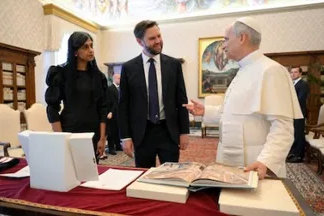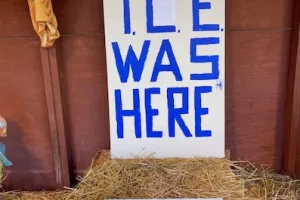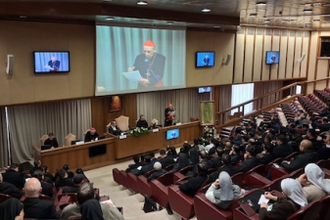Viewpoint: Mind the Gap - the Pope's radical vision of politics

Professor Ian Linden
In Britain the gap between our actual political horizons and the need for radical change is deep and wide. It is that gap and not the word radical that ought to inspire fear. 'Radical' means getting to the roots of a problem not twisting, turning and tweaking as things get predictably worse. The fear comes from sloppy use of the word as a synonym for extremism used to shut down all debate.
Compared to secular leaders, religious leaders have the advantage of a traditionally accepted way of highlighting the perils of business as usual and of expounding radical approaches. The religious code word for this form of discourse is 'prophetic'. It is a word that implies not just authority for seeing into the future but more importantly divine approval of the prophet's broad-brush account of what is wrong and ethical prescriptions for changing direction and putting things right.
Pope Francis' book Let Us Dream, published last year as a user-friendly and personalised synopsis of his lengthy and more formal encyclical Fratelli Tutti, is an excellent example of the prophetic mode. But his little book has proved to be much more than that. The pandemic provided a context in which prophetic words and ideas coming from an admired religious leader, speaking informally and intimately at a time of acute uncertainty and unprecedented upheaval, would be heard and considered. The secular Press carried respectful reviews. Waves of appreciative discussion washed through Catholic social media. There was none of the usual 'the Church shouldn't meddle in politics' though the book described what politics should be about but wasn't.
The subtitle of Let us Dream is The Path to a Better Future. Not an entirely accurate description of content. Popes do not prescribe in practical detail how to get from A to B. They provide counsel on where to find and how to read the signposts. The religious code for this is 'reading the signs of the times', or 'discernment' for short. Choosing pathways, turning principles and plans into practice is the role of politicians, civil servants, policy-oriented academics and experts in various disciplines. It should be achieved in close collaboration with civil society.
The remarkable feature of Francis' brand of prophetic writing is that it dovetails with others who start off from where he of necessity as a religious leader has to end. For example, the American political scientist Robert Putnam and the social entrepreneur Shaylyn Romney Garrett's How We Came Together a Century Ago and How We Can Do it again and Jon Cruddas MP's The Dignity of Labour go into the detail of what it will take to make absolutely vital changes. Tellingly the distinctly secular political and cultural weekly, New Statesman, asked the former Archbishop of Canterbury, Rowan Williams to review both these books.
The gap between the reality of our politics here in UK and the radical change imagined by Pope Francis seems unbridgeable. Let us Dream promotes change emerging from the margins and led by Popular Movements. "I call them 'social poets'. In mobilising for change, in their search for dignity", he wrote, "I see a source of moral energy, a reserve of civic passion, capable of revitalizing our democracy and reorienting the economy". Not to be confused with populism which "denies the proper participation of those who belong to the people, allowing a particular group to appoint itself the true interpreter of popular feeling". It is an understandable view given the Pope is Argentinian and the history of Latin America.
We get a glimpse of possibilities from the Black Lives Matter movement. But at present putting together a powerful, sustainable coalition for radical change in a British context is a daunting prospect. Progressive politics traditionally, culturally, aim at incremental changes. Finding an umbrella mobilising theme would be a beginning. Perhaps a Campaign to Defend our Democracy. There is something similar breaking ground in South Africa. In Britain It would require pulling together scattered, legal, human rights, environmental and civic initiatives.
Britain faces a particular difficulty in coming to terms with two overwhelming aspects of present reality. Firstly, we cannot and should not return to the injustice, anger and division of the old normal. But it is an inevitable reaction to the pandemic to want a return to normality. Secondly, we are in denial about our history. We want a brave and glorious past, a compensation for recent decline. "History is what was, not what we want it to have been", Pope Francis says in Let us Dream "and when we throw an ideological blanket over it, we make it so much harder to see what in our present needs to change in order to move to a better future".
Afforded a large Parliamentary majority, those who have most control over the past, present and future today, the Johnson government, demonstrate the paradox of a British form of authoritarianism undermining the British structure of governance hard won in the past . Less accountability, more control by the few for the few, more greed and self-interest, appear as the change they have in mind. Governing in this manner requires negligible concern for truth and thus negligible purchase on reality. Its vision of a better future is refracted through the short-term good of the Party. An obvious symptom of this authoritarianism is that serious challenge, within and without the inner circle of the Conservative Party, has been, and will be, punished: by expulsions, resignations/sacking. The old-fashioned alternative to coercion is persuasion.
But at the same time, focussed on a future of devastating Climate Change, a significant and growing consensus is emerging about the urgency of radical economic transformation and the social and political reforms that must accompany it. In Germany the Green Party's Annalena Baerbock, might even take the Chancellorship. We are seeing a growing consensus that unites religious and secular thinkers. Laudato Si, Francis' 2015 encyclical, grounding the Christian Green movement in the Bible and Revelation and calling for 'swift and united action' provides a supportive religious commentary on the report of the UN's 2009 Sustainable Development Commission. We need to go back to the 1960s when the Catholic emphasis on human dignity met the human rights movement for such a confluence of thinking.
Two other events give hope that popular movements are able to gain momentum and bring about change. There was the encouraging verdict of a jury in Minneapolis that at least one black life, George Floyd's, mattered enough to convict a police officer of murder. It was not just a matter of video cameras telling the story, the four officers filmed savagely beating Rodney King in 1992 were acquitted by a jury. Something had changed.
Then there was the remarkable response to the Super-League plans of twelve top football clubs. In UK demonstrations outside clubs that this should not stand several core values were voiced by the British football-loving public. Prominent was that despite a history of spectacular commercialisation football as a sport generated local community. A few multi-millionaire owners of the celebrity clubs would not be allowed to destroy this treasured expression of togetherness (it helped that for the six British clubs involved all these individuals were foreigners). Closely linked to this was that lesser, smaller clubs would be cut out from the financial benefits of the status quo in which skill and effort is rewarded with advancement, cups and big money. The giant-killer, Leicester City's spectacular 2016-2017 season, was used as the exemplar of football as the terrain of soccer meritocracy with the status quo providing redistribution of the money flowing through the system to the smaller clubs.
You might not agree with the values deployed to justify the public outrage - see Michael Sandel on meritocracy. But suddenly, community, sharing and the hopes of the less well-endowed were being brought into play in the public domain. Are these the morals of the British heart? If so, the question that comes to mind is why don't these values, held by the majority, or at least some of these explicitly held values, come into play in the run-up to elections?
True, the Pope's dream is as radical as it gets at a personal and social level. Yet he is not a voice crying in the wilderness. But if the fate of Martin Luther King's dream is anything to go by, the virtue of patience recommended by Pope Francis in Let Us Dream, will be indispensable. Meanwhile as the disembodied voice warns those waiting expectantly on the London Underground platform: 'Mind the Gap'.
Professor Ian Linden is Visiting Professor at St Mary's University, Strawberry Hill, London. A past director of the Catholic Institute for International Relations, he was awarded a CMG for his work for human rights in 2000. He has also been an adviser on Europe and Justice and Peace issues to the Department of International Affairs of the Catholic Bishops Conference of England and Wales. Ian chairs a new charity for After-school schooling in Beirut for Syrian refugees and Lebanese kids in danger of dropping out partnering with CARITAS Lebanon and work on board of Las Casas Institute in Oxford with Richard Finn OP. His latest book was Global Catholicism published by Hurst in 2009.
Visit his website here: www.ianlinden.com


















